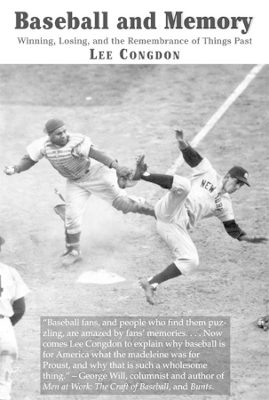
Baseball and Memory – Winning, Losing, and the Remembrance of Things Past
Seiten
2011
St Augustine's Press (Verlag)
978-1-58731-063-8 (ISBN)
St Augustine's Press (Verlag)
978-1-58731-063-8 (ISBN)
In this historical/philosophical reflection, Lee Congdon writes of the ways in which baseball spurs memory. This is particularly important at a time when many Americans suffer from a form of amnesia that renders them defenseless in the face of concerted efforts to seize possession of the past. “Who controls the past controls the future,” George Orwell wrote in Nineteen Eighty-Four, “who controls the present controls the past.” Baseball can, and does, stand in the way of those whose ambition it is to gain and maintain power by pretending that memory cannot be trusted; what was once thought to be “the past” was merely a fiction that served the interests of a ruling class.
This, Congdon argues, is asself-serving as it is untrue. Memory can play tricks on us, but, supported as it often is by confirming evidence, it alone can tell us who we are – and more. When we remember important moments and players from the game’s past, we soon discover that they are inextricably intertwined with particular eras in our common history: Babe Ruth and the Jazz Age, Joe DiMaggio and the country at war, Willie Mays and the 1950s. In often revelatory ways, those eras come alive again, and as a result we gain greater self-understanding, as individuals and as a people.
Although he draws upon the entire history of baseball, Congdon focuses primarily on the decade of the 1950s because he believes it to have been the game’s golden age – and a far better time in the nation’s history than Americans have been taught to think. Baseball’s continual invitation to communal remembrance can, he concludes, help us to avoid the fate reserved for those who forget.
This, Congdon argues, is asself-serving as it is untrue. Memory can play tricks on us, but, supported as it often is by confirming evidence, it alone can tell us who we are – and more. When we remember important moments and players from the game’s past, we soon discover that they are inextricably intertwined with particular eras in our common history: Babe Ruth and the Jazz Age, Joe DiMaggio and the country at war, Willie Mays and the 1950s. In often revelatory ways, those eras come alive again, and as a result we gain greater self-understanding, as individuals and as a people.
Although he draws upon the entire history of baseball, Congdon focuses primarily on the decade of the 1950s because he believes it to have been the game’s golden age – and a far better time in the nation’s history than Americans have been taught to think. Baseball’s continual invitation to communal remembrance can, he concludes, help us to avoid the fate reserved for those who forget.
PrefaceIntroductionWinningLosingThe FiftiesMemory SkepticsBibliographyAcknowledgmentsIndex
| Erscheint lt. Verlag | 20.5.2011 |
|---|---|
| Verlagsort | Indiana |
| Sprache | englisch |
| Maße | 158 x 241 mm |
| Gewicht | 380 g |
| Themenwelt | Sachbuch/Ratgeber ► Sport ► Ballsport |
| Geschichte ► Teilgebiete der Geschichte ► Kulturgeschichte | |
| Weitere Fachgebiete ► Sportwissenschaft | |
| ISBN-10 | 1-58731-063-5 / 1587310635 |
| ISBN-13 | 978-1-58731-063-8 / 9781587310638 |
| Zustand | Neuware |
| Haben Sie eine Frage zum Produkt? |
Mehr entdecken
aus dem Bereich
aus dem Bereich
der stille Abschied vom bäuerlichen Leben in Deutschland
Buch | Hardcover (2023)
C.H.Beck (Verlag)
CHF 32,15


